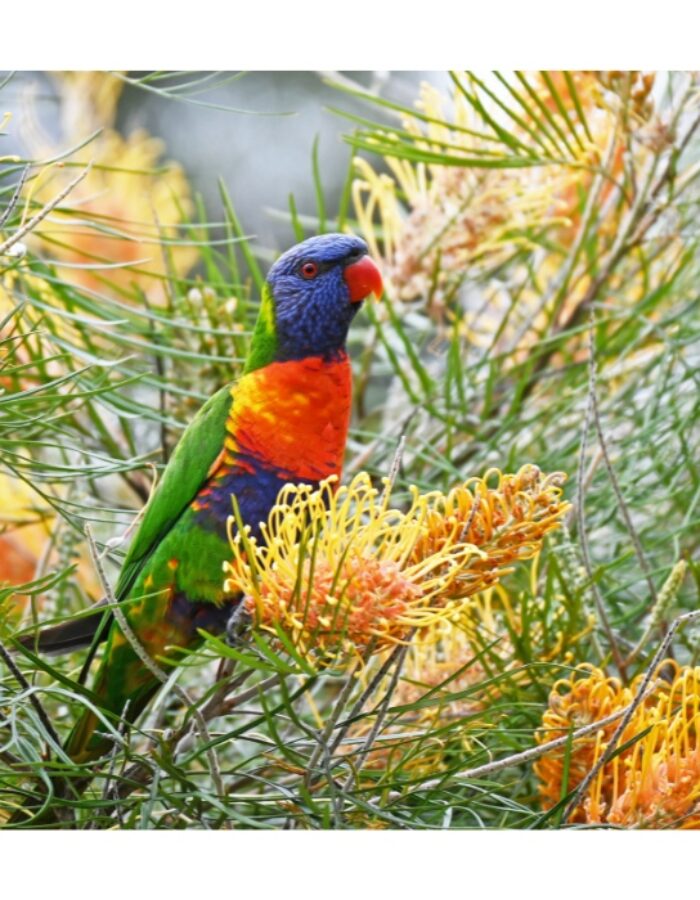
Chemicals should be a last resort in the battle against pests in the garden, says Angelo Eliades of DeepGreen Permaculture.
The biomedical scientist, who runs a highly productive demonstration food forest garden in Melbourne without using anything toxic, says there is a wide range of less harmful and less expensive strategies.
These include biological controls, physical barriers, practicing good garden hygiene and providing a healthy environment for plants.
For example, people sometimes go looking for a spray because they have borer infesting one of their trees.
His approach is to try and find out why the tree is being attacked. “The borers’ job is to finish off a tree that is already dying. You’ve got to look at the soil and the surrounding conditions,” he said.
“Plants have the equivalent of an immune system and they can repel pests and diseases just like we can. The more we look after plants and soil, the more they can help themselves and the less we have to put into the system,” he said.
One of the problems with chemical use is that after a mass spraying, you get a sudden die-off of the pests, followed soon after by a spike in the pest population. This can be because pest predators have also been killed and take longer than the pests to recover or because pests develop resistance to chemicals.
Chemicals also hang around in your soil and can move into waterways. They can also poison non-target species like beneficial insects and birds. People and pets are also at risk.
If chemicals are used on lawns, the pathways to unintentional ingestion are easy.
“When a toddler plays on lawn, they put their hands in their mouths. It’s a similar thing with pets – they will walk on the lawn, then groom themselves.”
Angelo said a lot of people were becoming aware of the risk of chemicals and wanting to live more sustainably.
‘If you’re a professional gardener, what you’ll start finding more and more is that certain clients will start requesting that they don’t want toxic chemicals used in their garden.”
In the last decade, gardeners and farmers have been moving to a strategy called Integrated Pest Management (IPM) which is based on prevention, monitoring and control.
“It’s a strategic, scientific approach that requires more brainwork than putting on a big spray pack and going out and killing everything,” he said.
One strategy is to use physical controls which deny the pest access.
For example, there are many kinds of netting and fencing.
“You can net a whole tree or use individual bags that go round the fruit or sleeves that go over branches…..Electric fencing works brilliantly on possums. Tree banding with a plastic or metal sheet and fence spikes also work well,” he said.
Another non-toxic strategy which has caught the attention of the horticultural world recently is Calcined Kaolin, a kind of clay, normally sold as an agricultural product to protect trees from sunburn. It is diluted in water then sprayed over the plant, leaving a whitish reflective layer on the stems and leaves.
An unexpected discovery was that the practice reduced the number of pest species. It is currently being used to combat Citrus Gall Wasp.
“Gall Wasp waits for new, green growth then goes and lays its eggs into that. If you coat the new growth with the Kaolin spray, they will usually avoid it. I believe it’s about 60% effective,” said Angelo.
He said knowing the life cycle of pests was important as was fertilizing at the right time so you don’t create ideal conditions for them.
He also told the audience about biological controls, such as insects, bacteria and nematodes.
Many people are surprised to learn, for example, that you can buy predatory wasps, ladybirds and lacewings.
“Once you bring these biological controls into your little ecosystem, they will do the work for you,” he said.
Angelo has spent several years reviewing every garden product in Australia for SGA.
“I’m pretty well aware of what the real impacts of most garden products are on people, pests, non-target species and other organisms. Not too many are really super ecologically sound,” he said.
SGA’s WiseGardening – Choices to Protect You and the Planet which rates products on their sustainability, is available here.
Angelo was the guest speaker at our September 2019 GGP Peer Evening meeting. The video recording of Angelo’s presentation can be accessed by GGP members in the GGP Industry Library. (contact us if you need your password re sent)


